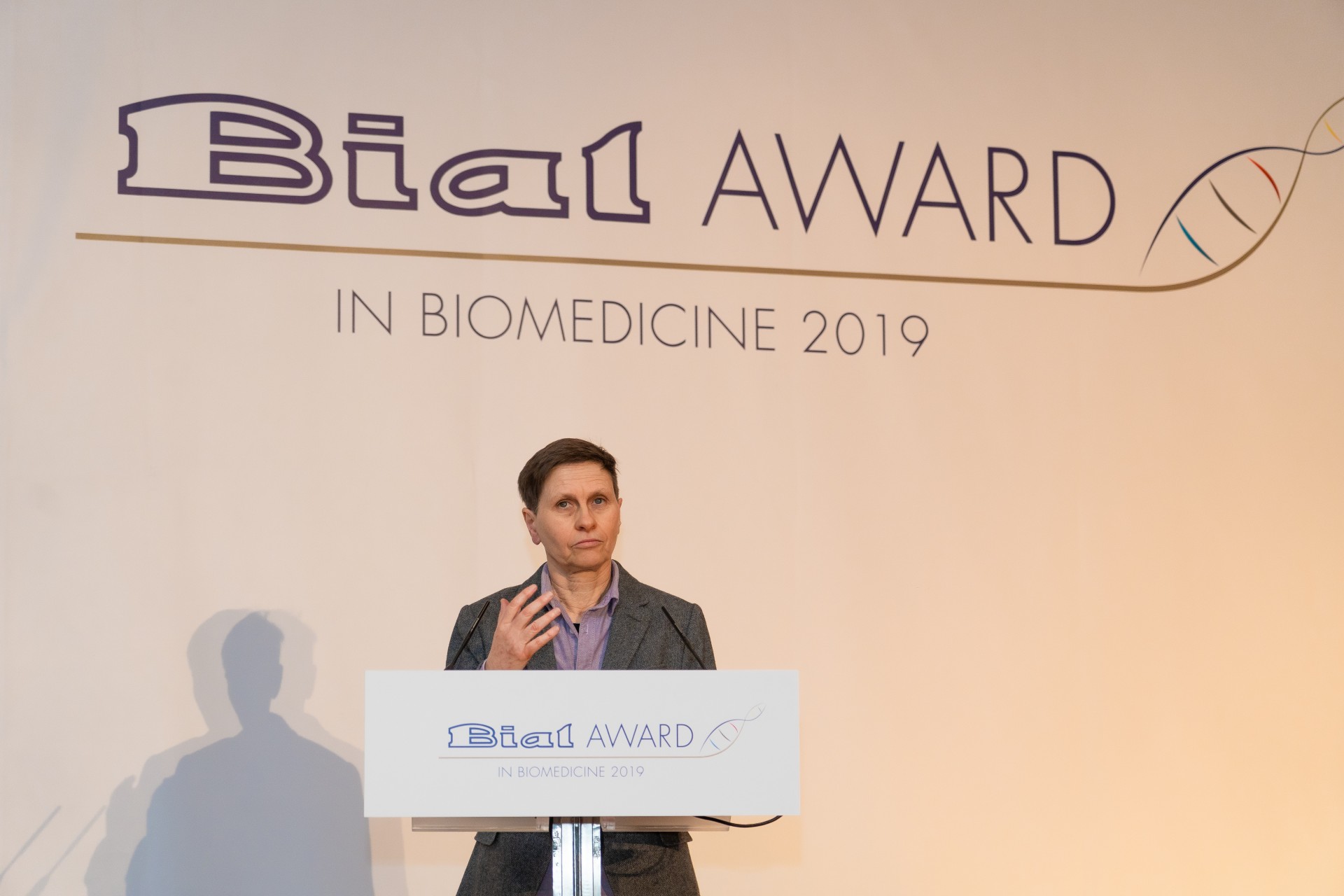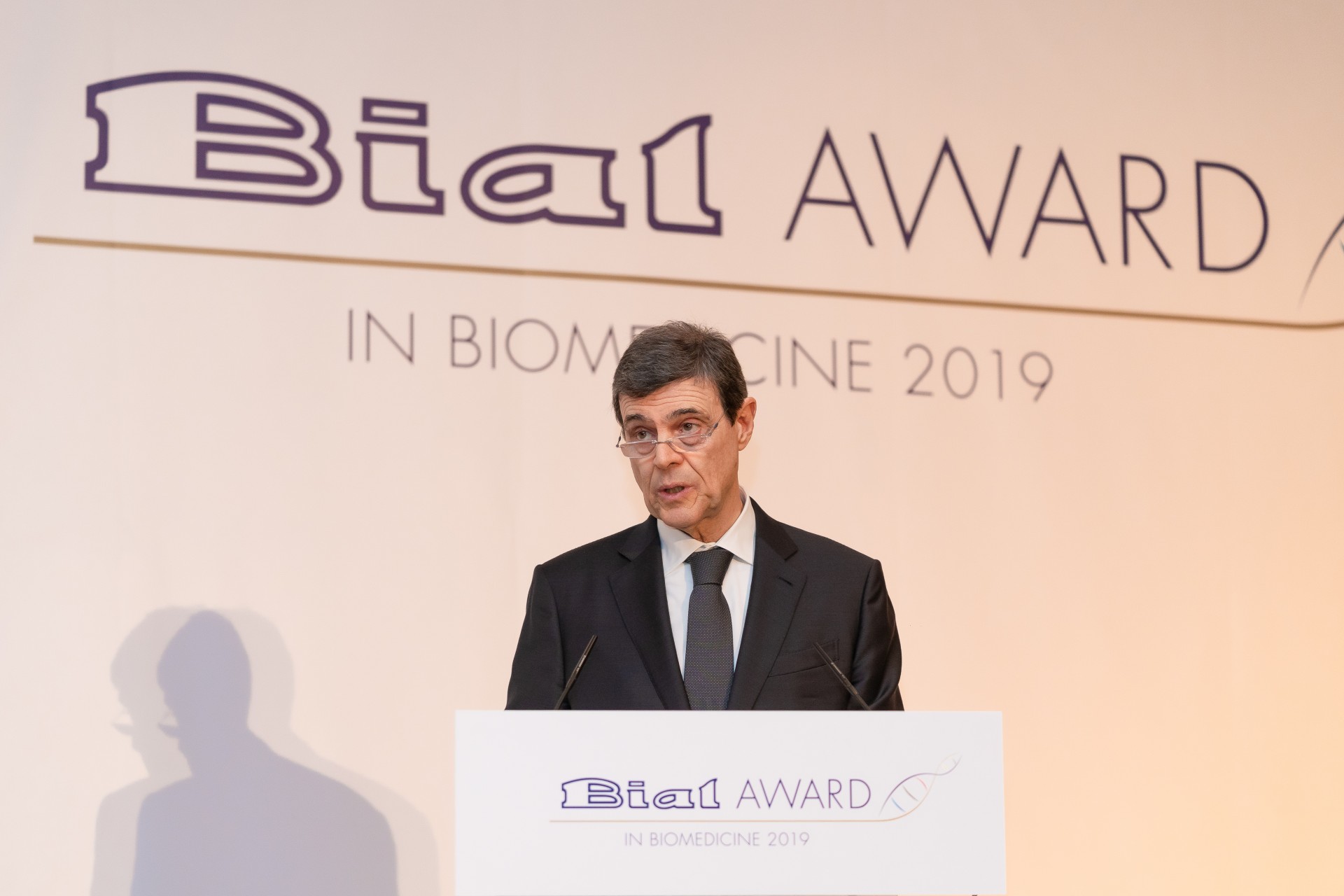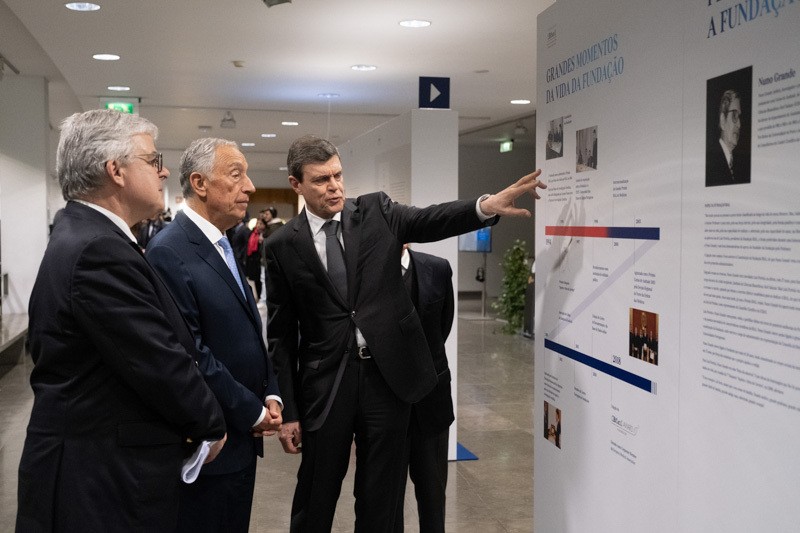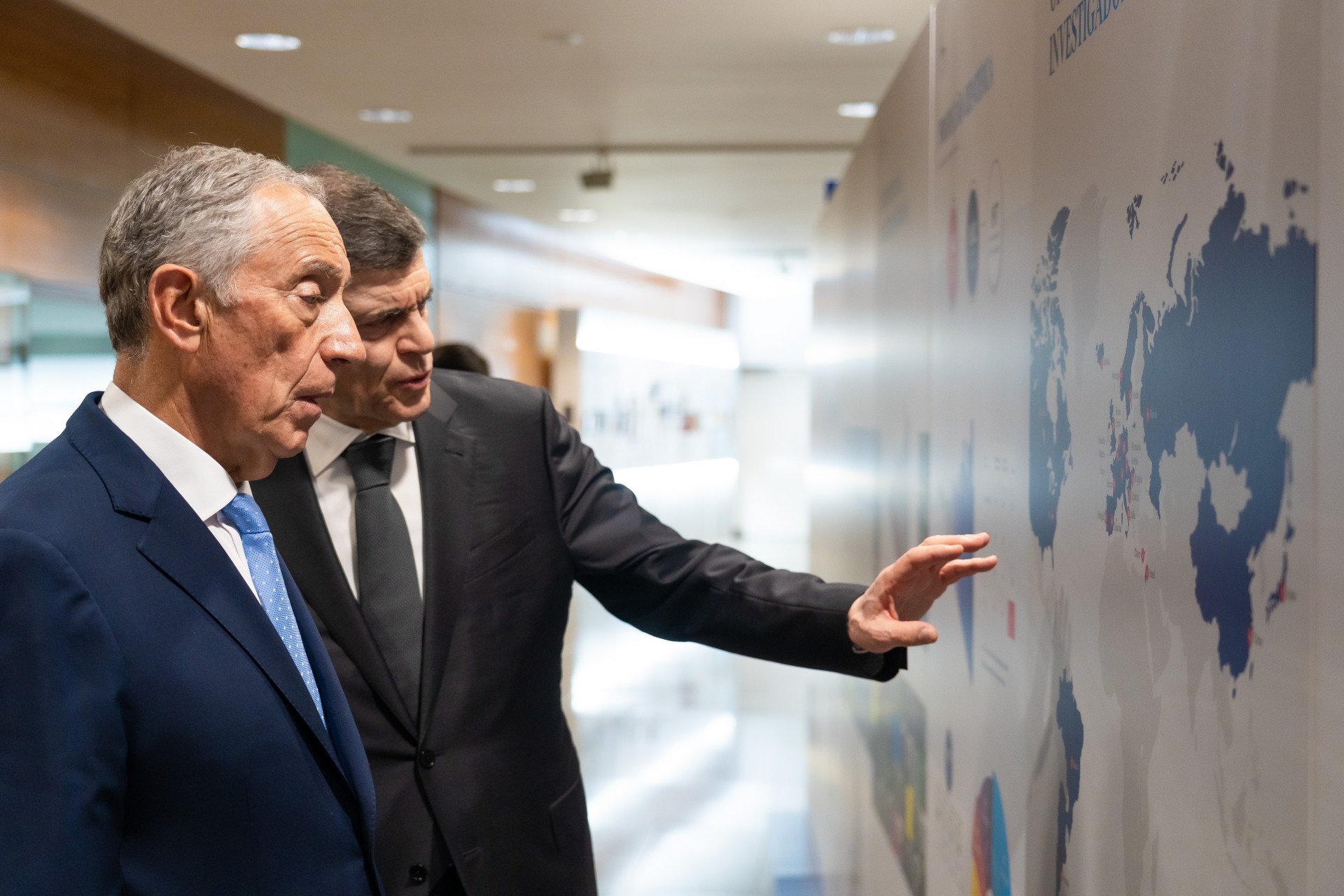“Almost all discoveries in medicine begin with a small observation in the laboratory, then it is necessary to interpret that observation and, eventually, only a small fraction can be transformed into a drug, a treatment, into something that really helps and improves people's lives”. This was how Professor Maria do Carmo Fonseca, Vice-President of the Bial Award jury, reminded us that all scientific discoveries contribute to increase human knowledge and improve the quality of life of the population, “but there are some that stand out for being particularly revolutionary”, referring to the work of Caetano Reis e Sousa, winner of the first edition of the Bial Award in Biomedicine 2019.


It was in the João Lobo Antunes Great Auditorium, in the Egas Moniz Building, that illustrious names of our science and politics applauded Professor Caetano Reis e Sousa and Dr Santiago Zelenay for winning the new award given by the Bial Foundation. The ceremony was chaired by the President of the Republic, Marcelo Rebelo de Sousa, and distinguished the research led by Caetano Reis e Sousa, published in the journal “Cell” in 2015 (work in which 12 authors from 6 different nationalities participated), which analyzes the aspirin and immune therapy for cancer combination.

Caetano Reis e Sousa lives and works in the United Kingdom, where he has pursued a brilliant scientific career, currently leading a team of researchers at the Francis Crick Institute. Argentine biologist Santiago Zelenay has also lived in the United Kingdom for several years, after completing his Ph.D. in Portugal. “The happy convergence of a Portuguese and an Argentine” - in the words of our President of the Republic - gave rise to a remarkable work not only for Biomedicine, but for all of us.
In a ceremony that praised Science to its maximum, the Director, Fausto J. Pinto, the President of the Bial Foundation, Luís Portela, the Chairman of the Medical Association, Miguel Guimarães, and the President of the Council of Rectors of the Portuguese Universities, António Fontainhas Fernandes, were present, among many other persons.


In his opening speech, Fausto J. Pinto praised the work of all professionals in the field of scientific and clinical research, in particular, the work of “excellence” of the Bial Foundation in the attribution of “stimulating awards for scientific development” in Portugal and across borders. As this is an international award, “it represents an important recognition to reinforce support for Science, and in particular for Biomedicine”, the latter being an extremely important area “in the medical and academic fields”.
He highlighted the importance attributed by FMUL, as an academic institution, to scientific development and research, and, above all, “to the translational component that is fundamental to apply knowledge for the benefit of communities”. Taking advantage of the occasion that brought together some of the main representatives of the national political power, Fausto J. Pinto reiterated the importance of supporting academic medical institutions, suggesting “the rethinking of some management models so that we can improve our performance and be, in fact, competitive in more varied levels, especially in this current phase of re-evaluation of what are and should be the objectives of clinical academic centres”.
He was followed by Luís Portela, who stated that the award in question arises from the desire to honour the best that has been done worldwide in the field of research in Biomedicine and has contributed the most to the health of the populations for the last 10 years. He also added that the system of research grants created by the Bial Foundation in 1994 has already supported around 700 research projects in the areas of Psychophysiology and Parapsychology, involving about 1500 researchers from 25 countries. About 21% of the projects that apply are supported, selected by the Scientific Council of the Foundation, presently chaired by Professor António Damásio and made up of 56 scientists from 14 countries.
Health professionals from 44 countries applied to this scientific research’s support system, which attests its increasing internationalization, he stressed. Approximately 40 proposals were submitted to the 2019 Bial Award in Biomedicine, one of the rules stating that the scientists themselves cannot apply. The jury, on the other hand, is composed mainly of international specialists from multiple areas and representatives of scientific societies, medical journals and universities.
Carmo Fonseca has no doubts about the enormous potential of the award-winning discovery, which originated several clinical trials in patients with different types of cancer, showing that Portugal “is playing in the first league of global science”. “In addition to the importance of an award that projects Portugal in the international scientific community, the team awarded in this edition is another reason for pride for Portugal because, first, the main author and mentor of this work is a Portuguese colleague, who has chosen a career in the United Kingdom, where he is recognized at the highest level by his British peers, and secondly because one of the main, younger members of the team, is an Argentine biologist who conducted his Ph.D. in Portugal. This means that our institutions and our laboratories are contributing internationally to provide scientific training to these professionals, who can then go to any part of the world, as is the case of Santiago, who is now an independent scientist”. She also referred to this award, whose ambition is “to be recognized, in the future, as a kind of preview of the Nobel Prize for Medicine - the maximum distinction that a scientist can aim for in recognition for his /her discoveries - a pre-Nobel Prize that values the potential of major discoveries”.
For his part, as a representative of the team “and co-winners”, Caetano Reis e Sousa said he was "very honoured" with the distinction, first of all thanking the iMM for the nomination of the work, now awarded, which he presented to the entire audience. This award has a much greater significance for its authors than the title encompasses. “It is a very important award because it is the recognition of a type of pre-clinical research which, sometimes, does not have the same recognition as the clinical application itself, but which is essential for the progress of medicine today”, said Caetano Reis e Sousa, reinforcing the need to establish “a very deep alliance between what we consider fundamental science, basic research and clinical application”. The study, entitled Cyclooxygenase-dependent tumour growth through evasion of immunity, focuses on "the area of cancer control by the immune system". The expert explained that there is a "great immune response against tumours that can be manipulated from a therapeutic point of view" and this prompted the study of the processes that lead to the acquisition of anti-tumour responses. The study focuses on the so-called "checkpoint inhibitor immunotherapies", points of regulation of the immune response. The researchers began to study dendritic cells, attempting to discover the possible existence of mechanisms through which tumour cells could eventually inhibit the activity of dendritic cells. Through pre-clinical models, that is, laboratory mice, researchers realized that such a hypothesis was true. The last phase of the work was to show that, in addition to being able to genetically manipulate tumour cells, it was also possible to manipulate pharmacology, in order to induce the same type of response. “Then what we tested were cyclooxygenase inhibitors - an enzyme for which there are several inhibitors, including aspirin", stated Caetano Reis e Sousa. "The experiment was very simple and consisted of combining aspirin with these checkpoint inhibitors. I think that this work is a good demonstration of the process by which a search for knowledge can lead and, perhaps, reveal new ways to target a certain disease and have therapeutic merit”.

Marcelo Rebelo de Sousa handed in the diplomas corresponding to the winning work and in his speech he praised the work of the Bial Foundation and the appreciation and affection shown by the scientists and all involved in the winning project, as well as by the entire FMUL community. “Thirty six years ago, a private foundation emerged and embraced health, life sciences and neurosciences, making them a cutting edge area. It started an award, supported hundreds of researchers and promoted scientific initiatives of excellence […], just to believe, then, that all this could be accomplished and change the face of Portuguese society was extremely unlikely, seen as something unreal, pure fiction. However, all of this happened, all of this went from idea to reality, all of this helped to change Portugal”. He stressed that the distinction “highlights the leap taken by so many in Portugal to leave the scientific periphery or the periphery of knowledge as a whole, in order to play an active role in promoting cutting edge Science, investing in change and innovation and increasingly placing them at the service of the community and committing to the great challenges facing Humankind”.

In addition to this gesture of praise, Marcelo Rebelo de Sousa paid tribute to the “merit of supporting knowledge, education, training and a change in mentality” of Luís Portela, who received, with emotion, the insignia of the Cross of the Order of Public Instruction, an act of gratitude for Science and Humanity, which will surely remain in everyone's memory.


The Bial Foundation, an independent and non-profit organisation, has pursued its main objective: to support health research through the attribution of awards, scholarships and funding for projects in the area of Medical Sciences. The work conducted over its 25 years of existence - often by distinguished members of our School – was shown in a travelling exhibition held in the lobby of the Egas Moniz Building.
And if this award is now a novelty, distinguishing the best of the best works in the field of Biomedicine, the Bial Foundation's desire to encourage medical research and disseminate works of great impact in the area of medical research is not new. It was started 36 years ago (biannually) through the granting of the BIAL Award for Clinical Medicine, which, in the 18 editions since 1984, has already distinguished 102 works from 276 authors, among whom stand the best Portuguese and foreign health professionals.
With the sponsorship of the Presidency of the Republic, the Council of Rectors of Portuguese Universities and the Medical Association, the BIAL Award has become one of the biggest Health awards in Europe, recognizing and distinguishing basic and clinical research.
Throughout the editions, this award has followed the evolution and trends of Medicine, having awarded several works in civilizational diseases, genetics, molecular medicine, imaging, and substitutive and regenerative therapies, among many others.
In 2017, in order to broaden the scope of the Foundation's activities and to acknowledge the most remarkable and relevant work in the biomedical area, the Bial Award in Biomedicine was created. This new prize, worth 300 thousand euros, is intended to recognise a biomedical work published as of 1 January 2010 with high quality results and scientific relevance. The award is supported by the President of the Portuguese Republic, the Council of Rectors of Portuguese Universities and the European Medical Association. “Thus, the Foundation decided to keep the award more focused on clinical research in even years and to create the new Bial Award in Biomedicine in the odd years, more comprehensive in terms of scientific importance but also in geographic terms”, explained Luís Portela.
Sofia Tavares
Editorial Team

